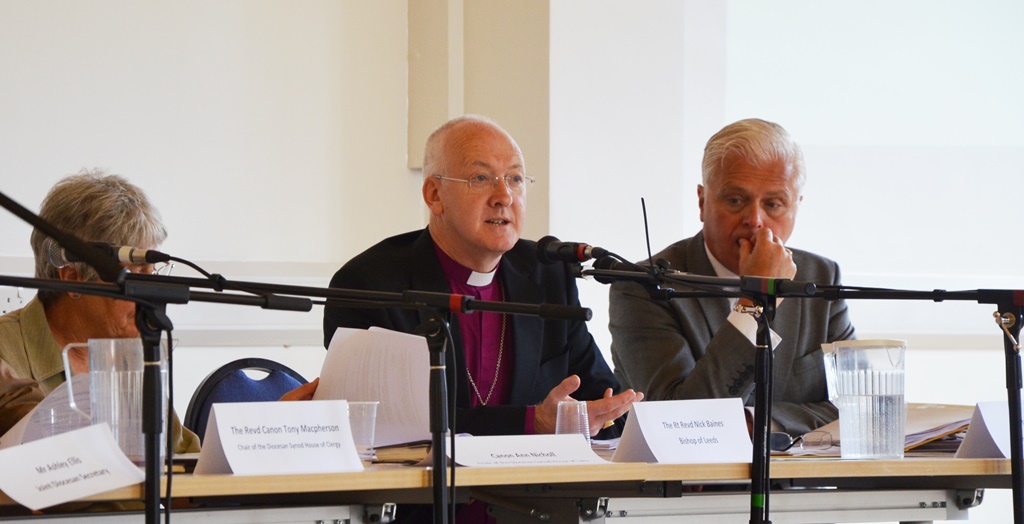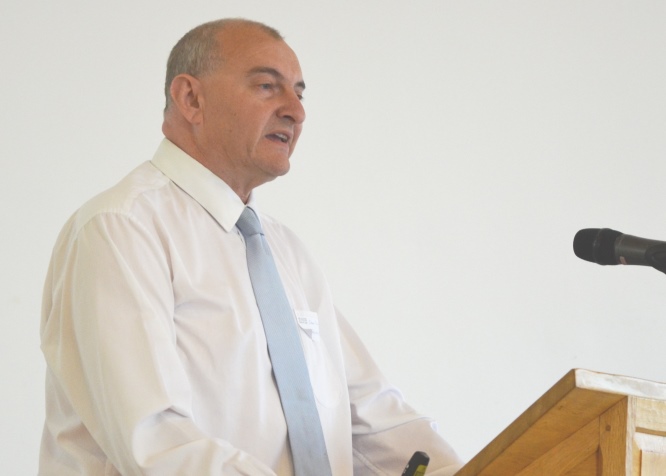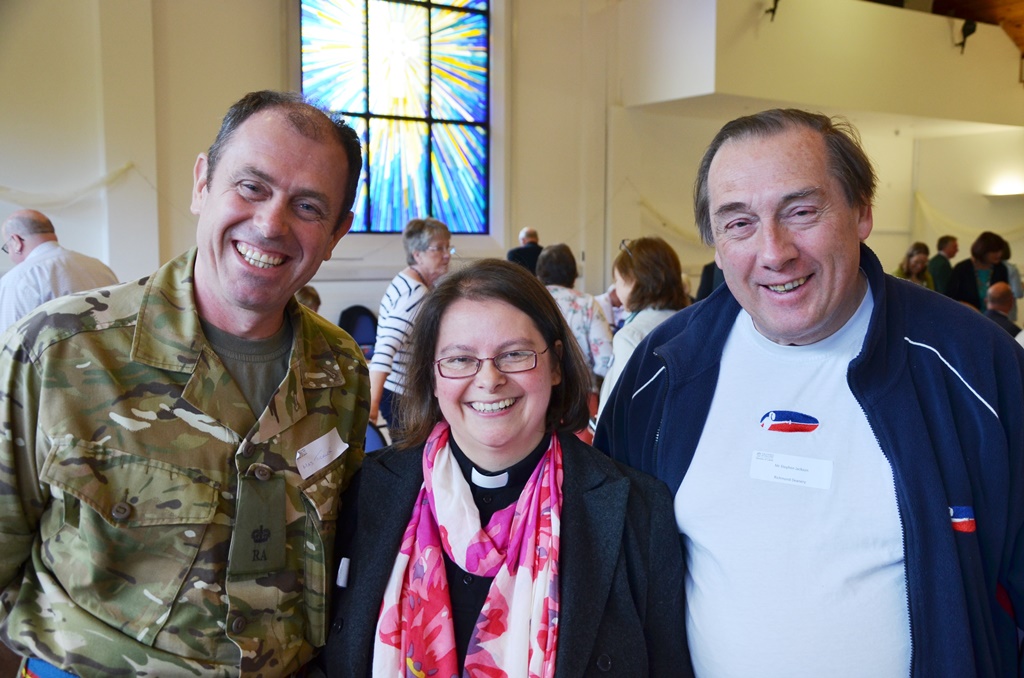 Church leaders meeting in Harrogate (July 16, 2016) have agreed a new scheme for collecting parish financial contributions - ‘parish share’ - which will be applied across the diocese from January 2017.
Church leaders meeting in Harrogate (July 16, 2016) have agreed a new scheme for collecting parish financial contributions - ‘parish share’ - which will be applied across the diocese from January 2017.
Members of the Diocese of Leeds Synod held at St Aidan’s High School also agreed a budget for 2017 which means that parishes will be asked to pay, on average, 2% more next year. Green energy was on the agenda as Synod members heard that a scheme piloted in Leeds and Bradford had netted churches substantial savings and would be rolled out to other parts of the diocese. And the army was represented at the Synod meeting as it was agreed to write to churches encouraging every parish to take practical action to support the Armed Forces Corporate Covenant.
In his Presidential address, the Bishop of Leeds, Nick Baines (pictured above left), said that the decisions being taken by Synod were a vital part of the process to reaching January 2017 “with our structural foundation in place and with clarity about the resources at our disposal”
“This year”, he told Synod members, “ we have been starting the processes of re-shaping, building on our new governance structures and developing our vision for prioritising our mission across the diocese and episcopal areas. We are nearly there, but the debates we have today, and the decisions we make, will allow us to be clear about where we start from on 1 January 2017.”
Read the text of Bishop Nick’s full address on his blog, here
Parish Share
Speaking in his Presidential Address about the proposed Parish Share scheme, Bishop Nick had warned,“What is clear in any such proposal is that not everybody will be happy.”
 Although not everybody was happy, the Parish Share Scheme proposal, modified by an amendment at Synod, was carried overwhelmingly. Parishes will hear in the Autumn what they will be asked to pay in 2017. Simon Baldwin (pictured left) of the Diocesan Share Review Group outlined the scheme which would be based on three components - the number of clergy in a parish (‘allocation of resources’), the relative ability to pay of a parish (calculated using the Index of Multiple Deprivation) and the size of the church based on relative regular Sunday attendance (fixed for three years so as not to stifle church growth).
Although not everybody was happy, the Parish Share Scheme proposal, modified by an amendment at Synod, was carried overwhelmingly. Parishes will hear in the Autumn what they will be asked to pay in 2017. Simon Baldwin (pictured left) of the Diocesan Share Review Group outlined the scheme which would be based on three components - the number of clergy in a parish (‘allocation of resources’), the relative ability to pay of a parish (calculated using the Index of Multiple Deprivation) and the size of the church based on relative regular Sunday attendance (fixed for three years so as not to stifle church growth).
However, Mr Baldwin said that several modifications had been made including removing the IMD component from small rural parishes. Restrictions were being proposed to soften the impact of the changes on parishes, including capping Share requests at 80%of a church’s Total Voluntary Income, and restricting increases and decreases to a church’s Share as a result of the new system – increases to no more than 15% and decreases to no more than 8%.
Amendments were tabled both to remove the restrictions ‘softening’ the changes, and to remove the church attendance component, but both failed to gain approval. However an amendment from the Revd Canon Paul Ayers, Vicar of Pudsey, to ask the Diocesan Board to investigate how restrictions and caps may be phased out, bringing a proposal back to Synod, was carried.
Armed Forces Covenant

 Major Derek Tickner, Quartermaster of the 5th Regiment, the Royal Artillery, (pictured left with Lindsay Southern and Steve Jackson, another speaker) was welcomed to Synod and spoke during a debate on whether parishes should be encouraged to engage with current and retired members of the armed forces as part of the Armed Forces Corporate Covenant, sighned by the Archbishops of Canterbury and York. Proposing the motion, Revd Lindsay Southern of Richmond Deanery said, “They return to your parishes and perhaps have no one around who understands what they have been through. There are increasingly complex issues faced by veterans including physical, mental, emotional, spiritual, moral issues, adjusting to civilian life, and financial hardships including a lack of employment…. It’s not about favouritism”, she added, “it’s about levelling the playing field.”
Major Derek Tickner, Quartermaster of the 5th Regiment, the Royal Artillery, (pictured left with Lindsay Southern and Steve Jackson, another speaker) was welcomed to Synod and spoke during a debate on whether parishes should be encouraged to engage with current and retired members of the armed forces as part of the Armed Forces Corporate Covenant, sighned by the Archbishops of Canterbury and York. Proposing the motion, Revd Lindsay Southern of Richmond Deanery said, “They return to your parishes and perhaps have no one around who understands what they have been through. There are increasingly complex issues faced by veterans including physical, mental, emotional, spiritual, moral issues, adjusting to civilian life, and financial hardships including a lack of employment…. It’s not about favouritism”, she added, “it’s about levelling the playing field.”

Opposing the motion, the Revd Nicholas Clews (pictured above right), Area Dean of Bradford North, said the Covenant was “part of a campaign over a number of years to militarise our society”. However, several speakers, including (pictured right) the Revd Canon Ian Greenhalgh, a former RAF Chaplain, now Area Dean of Bowland and Ewecross, spoke in favour and the motion was carried.
Accounts and Budget 2017
 The Accounts for 2015 were presented by the Revd Martin Macdonald (pictured left) of the Diocesan Board of Finance. They showed an 88% collection rate for Parish Share. However, despite the shortfall, the expected budget deficit of £773k in unrestricted funds became a n £867k surplus before investment gains were added. Factors which helped the diocese end the year in the black, said Mr Macdonald, included changes to pension accounting and clergy vacancies.
The Accounts for 2015 were presented by the Revd Martin Macdonald (pictured left) of the Diocesan Board of Finance. They showed an 88% collection rate for Parish Share. However, despite the shortfall, the expected budget deficit of £773k in unrestricted funds became a n £867k surplus before investment gains were added. Factors which helped the diocese end the year in the black, said Mr Macdonald, included changes to pension accounting and clergy vacancies.
The 2017 proposed Budget received approval by Synod. Mr.Macdonald told members, “The 2017 budget had been rigorously put together as it is and as its going to be.” Next year’s budget will include an increase in Parish Share of £309,000, or 2%, but expected reductions in money from investments and from the Church Commissioners. During the debate Bishop Nick explained that a new pot of money of £200k was being earmarked for the diocese by the Church Commissioners for specific mission projects in more deprived areas.
Green Energy
Synod members heard that a Green Energy Savings Scheme, piloted in 68 parishes across Leeds and Bradford Episcopal Areas has netted churches substantial savings of around £63,000 per annum, almost £1000 per church. The Archdeacon of Leeds, Ven. Paul Hooper (at his last Synod before retirement), and Environment Officer, Jemima Parker, gave a presentation to Synod and said that the scheme will now be rolled out to other parts of the diocese. “The key successes for the green journey so far” they said, “are, firstly, the significant number of churches that are now supplied with a renewable electricity tariff. This is a substantial step forwards in reducing our greenhouse emissions and will feed into the development of any future Diocesan or parish carbon reduction strategy.”
Clergy Housing and Refugees
Other debates during Synod included a motion from Huddersfield Deanery Synod calling on the Board of Finance to allow short term letting of vacant parsonages to refugees and other in crisis. But after extensive debate and an amendment, Synod agreed to adjourn the debate until its next meeting to allow time for further investigation of the possibilities.